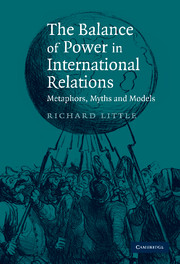8 - A composite view of the balance of power for the twenty-first century
Published online by Cambridge University Press: 05 October 2014
Summary
The main aim of this book has been to suggest that the balance of power has played a more interesting and complex role in international relations theory than is generally recognized. Yet it is not only critics of the balance of power who have provided an inadequate assessment of the concept, balance of power theorists themselves often fail to assess the work of earlier balance of power theorists adequately, or provide distorted accounts of the earlier assessments of the concept. The four theorists examined in this book all attempt to set themselves apart from other theorists. As a consequence, there has been an unintended but nevertheless persistent and pervasive tendency to underplay or over-simplify what others have had to say about the balance of power.
As we move into the twenty-first century, there are no signs of change on this front. In a recent survey of the literature, prior to making his own major contribution, Schweller (2006: 4), for example, traces the idea of an international balance of power back to the Renaissance where it is viewed as a ‘metaphorical concept’ that treats balancing behaviour as a response ‘driven by a law of nature’. He then goes on to argue that this conception of the balance of power ‘still infuses most discussions of how the theory operates’. This is not an idiosyncratic view and Schweller, moreover, has no difficulty finding quotations from previous balance of power theorists such as Morgenthau and Waltz to illustrate his assessment.
- Type
- Chapter
- Information
- The Balance of Power in International RelationsMetaphors, Myths and Models, pp. 251 - 287Publisher: Cambridge University PressPrint publication year: 2007



